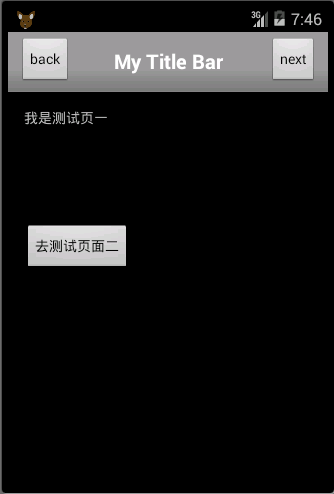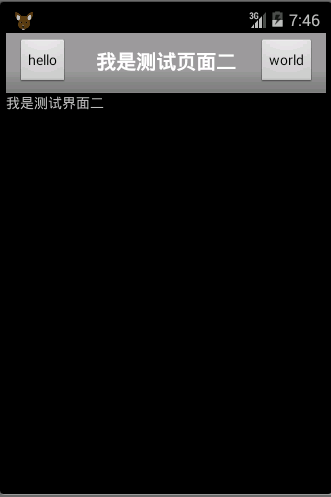【Android UI】自定义带按钮的标题栏
自定义标题栏在很多的android app中很常见,可以说是一种很有用的UI设计方法。自
己也本着学习的态度,经过一番各种坑,终于实现了,现总结如下:
一:大致流程
1. 对指定的android activity设置自定义主题风格,其中自定义主题风格是关键
在android 4.0以上版本中如果使用Theme.Holo或者Theme.Light等,程序会
一直报错误-you cannot combine custom title with other feature titles
2. 在对应的Activity中加入代码
super.onCreate(savedInstanceState);
requestWindowFeature(Window.FEATURE_CUSTOM_TITLE);
setContentView(R.layout.main);
getWindow().setFeatureInt(Window.FEATURE_CUSTOM_TITLE,R.layout.mycustomtitle);
3. 在styles.xml使用如下的自定义主题。
<resources> <style name="WindowTitleBackground" > </style> <style name="MyTheme" parent="android:Theme"> <item name="android:windowTitleSize">60dp</item> <item name="android:windowTitleBackgroundStyle">@style/WindowTitleBackground</item> </style> </resources>
二:测试MainActivity源代码
MainActivity.java
package com.example.title_bar;
import android.app.Activity;
import android.content.Intent;
import android.os.Bundle;
import android.view.View;
import android.view.View.OnClickListener;
import android.view.Window;
import android.widget.Button;
public class MainActivity extends Activity {
Button button;
@Override
protected void onCreate(Bundle savedInstanceState) {
super.onCreate(savedInstanceState);
requestWindowFeature(Window.FEATURE_CUSTOM_TITLE);
setContentView(R.layout.activity_main);
getWindow().setFeatureInt(Window.FEATURE_CUSTOM_TITLE,R.layout.titlebarstyle);
button=(Button) findViewById(R.id.button1);
button.setOnClickListener(new OnClickListener(){
@Override
public void onClick(View v) {
// TODO Auto-generated method stub
Intent intent=new Intent(MainActivity.this,test_title_bar.class);
startActivity(intent);
}
});
}
}
test_title_bar.java
package com.example.title_bar; import android.app.Activity; import android.os.Bundle; import android.view.Window; import android.widget.Button; import android.widget.TextView; public class test_title_bar extends Activity{ @Override protected void onCreate(Bundle savedInstanceState) { super.onCreate(savedInstanceState); // 去标题 //requestWindowFeature(Window.FEATURE_NO_TITLE); requestWindowFeature(Window.FEATURE_CUSTOM_TITLE); setContentView(R.layout.titlebartest); //设置标题为某个layout,标题样式 getWindow().setFeatureInt(Window.FEATURE_CUSTOM_TITLE, R.layout.titlebarstyle); //设置标题栏的标题 settitle("hello","我是测试页面二","world"); } private void settitle(String btn1str,String string,String btn2str) { // TODO Auto-generated method stub Button btnback=(Button) findViewById(R.id.back); Button btnnext=(Button) findViewById(R.id.next); TextView tvtitle=(TextView) findViewById(R.id.title); btnback.setText(btn1str); tvtitle.setText(string); btnnext.setText(btn2str); } }
三:XML资源文件
titlebarstyle.xml的内容
<RelativeLayout xmlns:android="http://schemas.android.com/apk/res/android" android:layout_width="fill_parent" android:layout_gravity="fill_horizontal" android:orientation="horizontal" android:layout_height="fill_parent" > <Button android:id="@+id/header_left_btn" android:layout_width="wrap_content" android:layout_height="wrap_content" android:layout_alignParentLeft="true" android:layout_marginLeft="5dp" android:layout_centerVertical="true" android:text="back" android:textColor="#000000"/> <TextView android:id="@+id/header_text" android:layout_width="fill_parent" android:layout_height="fill_parent" android:layout_toRightOf="@+id/header_left_btn" android:layout_toLeftOf="@+id/header_right_btn" android:text="My Title Bar" android:textSize="20sp" android:textStyle="bold" android:textColor="#FFFFFF" android:gravity="center" android:layout_centerHorizontal="true" android:layout_centerVertical="true" android:singleLine="true" /> <Button android:id="@+id/header_right_btn" android:layout_width="wrap_content" android:layout_height="wrap_content" android:layout_alignParentRight="true" android:layout_marginRight="5dp" android:layout_centerVertical="true" android:text="next" android:textColor="#000000"/> </RelativeLayout>
activity_main.xml
<RelativeLayout xmlns:android="http://schemas.android.com/apk/res/android" xmlns:tools="http://schemas.android.com/tools" android:layout_width="match_parent" android:layout_height="match_parent" android:paddingBottom="@dimen/activity_vertical_margin" android:paddingLeft="@dimen/activity_horizontal_margin" android:paddingRight="@dimen/activity_horizontal_margin" android:paddingTop="@dimen/activity_vertical_margin" tools:context="com.example.title_bar.MainActivity" > <TextView android:id="@+id/textView1" android:layout_width="wrap_content" android:layout_height="wrap_content" android:text="我是测试页一" /> <Button android:id="@+id/button1" android:layout_width="wrap_content" android:layout_height="wrap_content" android:layout_below="@+id/textView1" android:layout_marginTop="97dp" android:text="去测试页面二" /> </RelativeLayout>
titlebartest.xml
<?xml version="1.0" encoding="utf-8"?> <LinearLayout xmlns:android="http://schemas.android.com/apk/res/android" android:layout_width="match_parent" android:layout_height="match_parent" android:orientation="vertical" > <TextView android:id="@+id/textView1" android:layout_width="wrap_content" android:layout_height="wrap_content" android:text="我是测试界面二" /> </LinearLayout>
最后别忘记在android的manifest配置文件中加上自定义的主题
android:theme="@style/MyTheme"
界面一:

界面二:



